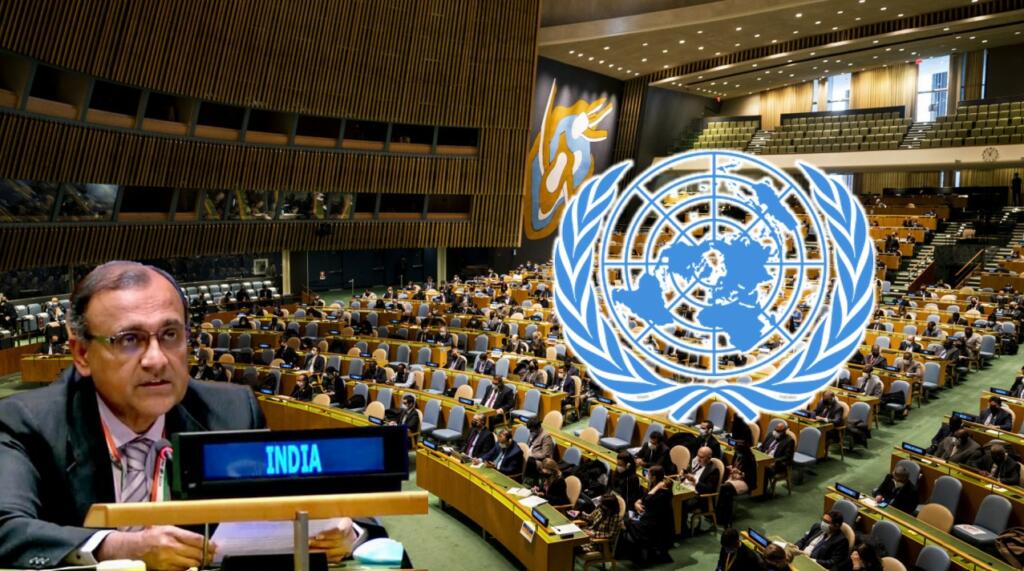- India has come out to denounce the UN for declaring March 15 as an international day to combat Islamophobia
- India clearly pointed out that people from every religion are killed and that’s why we should use the word religiophobia
- UN’s ignorance of Islam led violence made India take a strict stand for people of non-Abrahamic religions
Sounds ironic, but ever since Islamists attacked the twin towers in the USA, a doctrine called Islamophobia has become prevalent in international diplomacy. So much so that United Nations (UN) has reserved a special day to recognise the hypothetical phenomenon. By recognising this Islamists’ pleasing term, the UN ensured that actual persecuted groups remain voiceless. But, not anymore, as India has come forward to give voice to them.
Recognise religiophobia not Islamophobia-India to UN
Nothing could be more emphatic than India’s unequivocal denouncement of recognition of Islamophobia by the UN. While putting forward India’s views on the international day of Islamophobia sponsored by OIC, TS Tirumurti, India’s Ambassador to the UN asked the UN to recognise all forms of religious violence, rather than just one.
Asserting that resolution to recognise phobia against one particular religion may lead to divide the UN, Trimurti said, “We hope that the resolution adopted today (Tuesday) does not set a precedent which will lead to multiple resolutions on phobias based on selective religions and divide the United Nations into religious camps.”
United Nations is biased towards Abramanism
Trimurti pointed out the pro-Abrahamic bias of the United Nations and said that phobias against religion are not limited to Abrahamic ones. Informing the UN about the anti-Hindu, anti-Buddhist and anti-Sikh violence, Trimurti said, “such (religious) phobias are not restricted to Abrahamic religions only. In fact, there is clear evidence that over decades such religiophobia has, in fact, affected the followers of non-Abrahamic religions as well. This has contributed to the emergence of contemporary forms of religiophobia, especially anti-Hindu, anti-Buddhist and anti-Sikh phobias.”
Trimurti also cited historical evidence of religiophobia against non-Abrahamic religion to substantiate his point. “The destruction of Bamyan Buddha, violation of gurudwara premises, massacre of Sikh pilgrims in gurudwara, attack on temples, glorification of breaking of idols in temples etc contribute to the rise of contemporary forms of religiophobia against non-Abrahamic religions,” said Trimurti.
Hindus, Sikhs, Buddhists are also persecuted
India’s envoy specified that total of 2.08 billion Hindus, Buddhists and Sikhs are facing discriminatory practices. Giving out these numbers, the envoy asked the UN to recognise religiophobia rather than Islamophobia. Expressing fears that resolution against Islamophobia may end up hurting the good sentiments behind it, Trimurti said, “Celebration of a religion is one thing but to commemorate the combatting of hatred against one religion is quite another. In fact, this resolution may well end up downplaying the seriousness of phobias against all other religions”
Read more: Muslim girl cries wolf about Islamophobia in school, but it turns out to be a white lie
However, the UN did not heed India’s appeal of unifying the whole world as a single unit and went ahead with the divisive approach of declaring March 15 as an international day to combat Islamophobia.
Islamophobia – A victim card played by the actual oppressors
The word Islamophobia is believed to be originated in 1923. However, it is only after the 9/11 terrorist attack that the word came into prominence. After 9/11, the Bush administration started multiple front fights against Islamists to ensure that no such terrorist incident is repeated in the country. The mission has been successful till now, but Islamists found a new way to invade western democracies.
Citing a few instances of injustice against an average Muslim, Islamists started to play the victim card. They were supported by IVY-league cultural Marxists, left-liberal media and feminists who always find a reason to support one of the most women oppressing institutions in the world. Movies were made, songs reverberated across the digital platform, stories were written glorifying the lifestyle based on 1400 years old book.
Read more: A pregnant criminal is still a criminal. Delhi court refuses bail Delhi riots accused Safoora Zargar
If you do not support them, you are Islamophobic
By building a wave of pro-Islam narratives, the detractors and opposers of the narratives were termed as Islamophobic. Slowly, the word spread to local administration and even a normal administrative action that goes against a Muslim individual was termed as Islamophobia. The term became so prevalent that the UN (already not so vigilant organisation to start with) gave its assent to recognise it.
Meanwhile, while the term Islamophobia was gaining traction, people from other religions kept getting killed by radical Islamists. London bombings of 2005, Paris attacks of 2015, Manchester arena bombings of 2017 were some of the bigger terrorist attacks faced by westerners.
India taking an initiative
In the Asian subcontinent, various Hindu-Muslim riots are clear examples of how Islamists treat people of other religions. Even these riots were utilised by narrative warriors as Islamophobia. Most recently, leftists tried to utilise Delhi Riot as anti-Islam, only to fail in the wake of the presence of alternative media platforms in India.
Read more: Delhi Court recognises role of media in twisting narratives in the Delhi Riots case
People from every religion are killed in intra-religious warfare. To recognise one at the expense of others shows how UN gas become nothing but a useless organisation repeating left-liberals talking points. However, India has given a shade of hope to billions of people affected by negative bias against them because of their religion.
